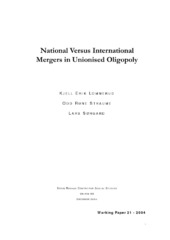| dc.contributor.author | Lommerud, Kjell Erik | eng |
| dc.contributor.author | Straume, Odd Rune | eng |
| dc.contributor.author | Sørgard, Lars | eng |
| dc.date.accessioned | 2006-06-21T12:25:29Z | |
| dc.date.accessioned | 2020-12-10T06:34:29Z | |
| dc.date.available | 2006-06-21T12:25:29Z | |
| dc.date.available | 2020-12-10T06:34:29Z | |
| dc.date.issued | 2004-12 | eng |
| dc.identifier.issn | 1503-0946 | |
| dc.identifier.uri | https://hdl.handle.net/1956/1352 | |
| dc.description.abstract | We analyse how the presence of trade unions affects the pattern of mergers in an international oligopoly and the welfare implications thereof. We find that wages for the merger participants are always lower when they merge internationally, rather than nationally. Using a model of endogenous merger formation, we find that the firms will merge internationally in equilibrium. There are more international mergers than socially preferred, unless products are close substitutes. A ‘national champion’ policy of promoting domestic mergers rather than international ones is nevertheless never optimal. | en_US |
| dc.format.extent | 717654 bytes | eng |
| dc.format.mimetype | application/pdf | eng |
| dc.language.iso | eng | eng |
| dc.publisher | Stein Rokkan Centre for Social Studies | eng |
| dc.relation.ispartofseries | 21-2004 | |
| dc.relation.ispartofseries | Working Paper | en |
| dc.title | National Versus International Mergers in Unionised Oligopoly | eng |
| dc.type | Working paper | eng |
| dc.subject.nsi | VDP::Samfunnsvitenskap: 200 | nob |
